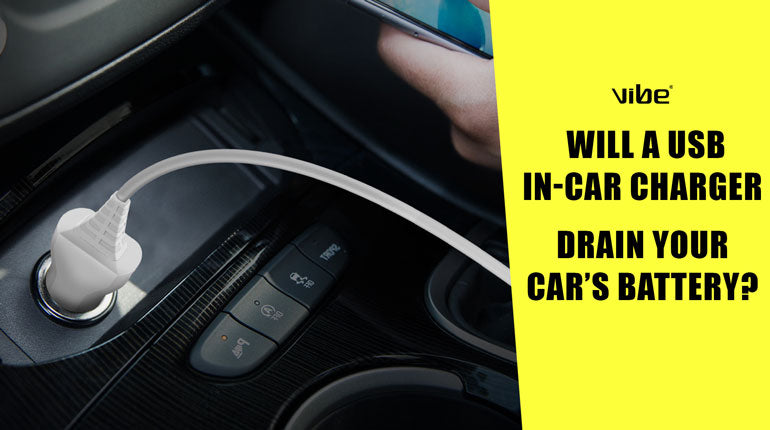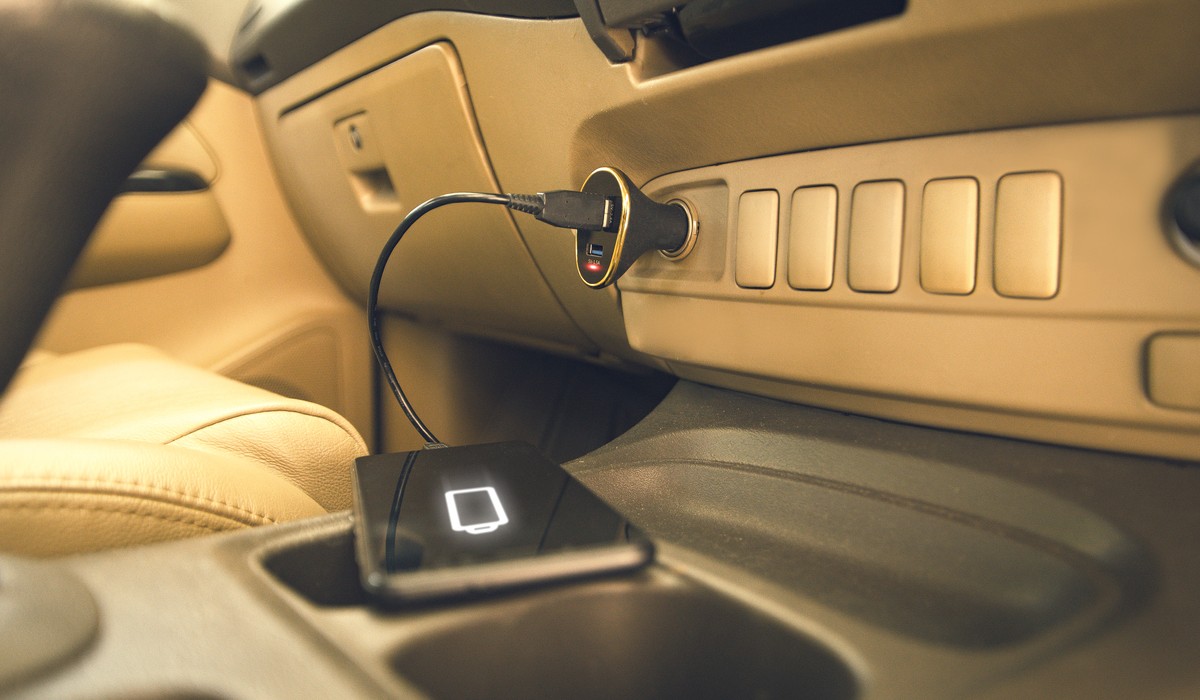Charging your phone using a car battery can drain the battery if the engine is off. Minimal power is used when the car is running.
Charging a smartphone in your vehicle has become as commonplace as using the radio. Yet, it’s essential to understand how this can impact your car’s battery. Car batteries are designed to provide a large amount of current for a short period to start the engine.
Once the engine is running, the alternator recharges the battery and powers electrical accessories like your phone charger. The energy consumed to charge a phone is relatively small, but if your engine isn’t running and you’re charging for an extended period, it could significantly affect your battery’s charge. For drivers who make many short trips or have an older battery, being mindful of phone charging habits is especially crucial to avoid being stranded with a dead battery.
Introduction To Phone Drain the Car Battery In Cars
Imagine You’re on a road trip, your phone’s battery is low, and the GPS is your lifeline.
You plug your phone into the car’s USB port or lighter socket, believing it’s a simple solution.
But could this action drain your car’s battery? This is a genuine concern for many drivers.
Understanding the dynamics of phone charging in cars is crucial.
It helps drivers maintain both their vehicle’s battery health and stay connected.
The Age-old Question
Will charging a phone deplete a car’s battery? This question has sparked numerous discussions.
Drivers often wonder if phone charging could lead to car start-up issues.
Why This Matters
This subject is more critical than just convenience.
It touches on the integrity of your vehicle’s electrical system.
Safe, efficient travel requires a well-functioning car battery.
Let’s delve into the impact of phone charging on car batteries.
We will explore common myths and provide valuable insights.
How Car Batteries Work
Welcome to the insightful world of car batteries!
Understanding how they power our vehicles is critical.
Basics Of Car Battery Operation
Car batteries provide the crucial spark that ignites the engine’s fuel mixture.
They also power electrical systems when the engine is off.
- Lead-acid batteries are standard.
- They have lead plates and sulfuric acid.
- Chemical reactions inside create electricity.
Car batteries store energy in chemical form.
They convert it to electrical energy on demand.
The Role Of The Alternator
The alternator charges the battery while the engine runs.
It converts mechanical energy into electrical energy.
This process is vital for battery health and long life.
| Component | Function |
|---|---|
| Alternator | Recharges the battery |
| Regulator | Controls voltage |
Without the alternator, the battery would drain quickly.
It provides electricity to the vehicle’s electrical system.
Understanding Phone Battery Needs
Smartphones have become vital in our daily lives. They need power to function, so it’s important to understand how charging affects a car battery.
Energy Requirements Of Smartphones
Smartphones perform many tasks. They need energy for this. Battery life varies by phone use and model.
Key points about smartphone energy needs:
- Screen size and brightness impact battery drain
- Apps and updates consume power
- GPS and data connections increase energy use
Most smartphones use Lithium-ion batteries. They are light and charge fast.
Comparing Phone And Car Battery Capacities
Car batteries are different from phone batteries. They are bigger and store more power.
Here’s a comparison:
| Device | Battery Capacity | Type |
|---|---|---|
| Smartphone | 3,000 – 5,000 mAh | Lithium-ion |
| Car Battery | 45,000 – 60,000 mAh | Lead-acid |
Smartphones need less power than car batteries. Charging your phone uses a small part of the car’s battery life.

Credit: www.houstonchronicle.com
Myth Vs. Reality: Impact On Car Battery
Many drivers worry about their car batteries when charging mobile devices. Let’s explore the truth behind this concern.
Common Misconceptions
Charging phones in cars leads to dead batteries—this belief is widespread. Yet, not all drivers know how car batteries and phone chargers interact.
- Myth: Any phone charger will damage the car battery.
- Myth: A car must be running to charge devices.
- Myth: Frequent phone charging strains the battery.
The Truth About Phone Charging And Car Batteries
The real impact of phone charging on car batteries is often misunderstood. Here’s what’s true:
| Aspect | Reality |
|---|---|
| Engine Off | Charging with the engine off can drain the battery if done for hours. |
| Engine On | Charging while driving is safe. The alternator recharges the battery. |
| Battery Health | Healthy batteries handle occasional charging without issues. |
Short sessions of phone charging won’t hurt. Modern cars are designed to manage small electrical loads with ease.
Remember, battery age and health are critical. An old or weak battery might struggle more.
Situations That Drain Car Batteries
Understanding what drains a car battery is vital for any driver. Some everyday habits can cause you to need a jump start. Below are situations to watch out for.
Leaving Lights On
Car batteries lose charge when accessories stay on without the engine running. This includes headlights, interior lights, or even the trunk light. It’s easy to forget these after parking your car. Overnight, they can seriously drain your battery. Modern vehicles may alert you, but older models won’t.
Long-term Inactivity
Batteries naturally discharge over time. If a car sits unused, its battery can deplete. This is common during vacations or if you have a spare car. To prevent this, try to drive the car regularly or consider a battery maintainer. It keeps the charge level up during extended periods of inactivity.
Charging Electronic Devices
Devices like phones and GPS units draw power from the battery. Charging these while the car is off can lead to a dead battery. Always plug in devices when the vehicle is running. This way, the alternator recharges the battery simultaneously.

Credit: www.carparts.com
Does Charging While Driving Help?
Many drivers wonder about the impact of charging their phones on their car’s battery. Understanding the effects is critical to keeping your phone and car in good shape.
Advantages Of Charging On The Go
Charging your phone while driving can be incredibly convenient. Here are some benefits:
- Stay connected: Keep your device powered up for navigation and communication.
- Use car’s power: Modern vehicles are designed to handle additional charging without draining the battery.
- Smart charging: Some vehicles have intelligent USB ports that optimize charging and prevent battery strain.
Potential Issues To Consider
While charging in the car is handy, it’s essential to be aware of potential issues:
| Issue | Explanation |
|---|---|
| Older vehicles | It may not handle the extra load well, leading to battery drain. |
| Continuous charging | It can wear out the car’s battery over time if not managed. |
| Engine off | Charging without the engine running can deplete the car battery. |
Constantly monitor your battery’s health and charge your phone responsibly to avoid any problems.
Tips For Safe Phone Charging In Your Car
Keeping your phone charged on the go is essential. But doing it safely is just as important, especially regarding your car’s battery. To avoid draining your car battery, follow these simple tips for safe phone charging.
Choosing The Right Charger
Not all chargers are equal. Using the correct charger ensures efficient charging and protects your car’s battery.
- Match the output with your phone’s requirements.
- Use chargers certified by your phone’s manufacturer.
- Avoid cheap, unbranded chargers that can harm your phone and car battery.
Best Practices For Battery Health
Consider these best practices to maintain the health of your car’s and phone’s battery.
- As the engine runs, charge your phone.
- Unplug the charger when not in use to save your car’s battery.
- Keep your phone cool while charging to prevent overheating.
Remember, your car’s battery is the lifeline when you’re on the move. Take care of it, and it will take care of you.
Alternatives To Using Car Battery For Charging
Are you concerned about your car battery while charging your phone? Let’s explore smart alternatives that keep your devices powered up without draining your vehicle’s energy reserves.
Portable Power Banks
Carry power in your pocket. Power banks are the go-to solution for on-the-go charging. They are:
- Compact and easy to carry
- Rechargeable, with multiple uses on a single charge
- Versatile, compatible with various devices
Choose a power bank with ample mAh capacity. It ensures your phone stays on all day.
Solar Chargers And Their Benefits
Embrace the power of the sun. Solar chargers are eco-friendly and provide endless energy as long as there’s sunlight. Benefits include:
| Benefit | Description |
|---|---|
| Eco-Friendly | Uses renewable energy, reducing carbon footprint |
| Cost-Effective | No electricity bills, sunlight is free |
| Portable | Lightweight and foldable designs are available |
For best results, place your solar charger in direct sunlight. Your devices will thank you.
Expert Opinions And Case Studies
Drivers often wonder if charging phones can drain car batteries. Expert opinions and case studies shed light on this common concern. Let’s delve into what mechanics say and real-world examples to clarify the effects of phone charging on car batteries.
Mechanics Weigh In
Auto technicians offer insights into the relationship between phone charging and car battery health. Their years of experience provide a trusted perspective.
- Minimal impact: Mechanics confirm that charging phones generally have little effect on a healthy car battery.
- Engine off: Charging the engine off can drain the battery over time.
- Short trips: Frequent short drives with phone charging may not allow the battery to recharge fully.
Real-world Examples
Case studies provide practical evidence of phone charging’s impact on car batteries. These stories come from drivers’ everyday experiences.
| Scenario | Outcome |
|---|---|
| Long-term parking: Car parked with phone plugged in | Battery drained |
| Daily commutes: Phone charged during short drives | No significant battery issues |
These examples show that while occasional charging is safe, certain habits can risk battery health.

Credit: vibecentre.com
Conclusion: Balancing Convenience And Care
Many people charge their phones in their cars daily. However, it’s vital to understand the impact on your car’s battery. Smart practices ensure your car battery remains healthy while you enjoy the convenience of on-the-go charging.
Final Thoughts On The Topic
Charging your phone in the car won’t likely drain the battery if you follow best practices. Keep drives long enough to replenish the used charge. Remember, short trips with phone charging could strain the battery over time.
Future Considerations For Car And Phone Technology
Advancements in technology may soon provide solutions to current limitations. We can expect more efficient batteries in both phones and cars. These will allow safer, more effective charging without worrying about draining your car’s battery.
- Wireless charging systems could integrate into vehicles seamlessly.
- Smart charging apps might manage energy use more effectively.
- Car batteries may evolve to support increased electronic demands.
Staying informed and adapting to new technologies will ensure we balance convenience with the care of our devices and vehicles.
Frequently Asked Questions
Is It Bad To Leave Your Phone Charging In The Car?
Leaving your phone charging in the car can be harmful. Extreme temperatures may damage the battery or device, and car break-ins are also risky when electronics are visible. Charge safely indoors when possible.
Is It Okay To Leave Phone Charger Plugged In Car?
Leaving a phone charger plugged into a car is generally safe if the ignition is off, but it may drain the battery over time. Always check the car’s manual for specific guidelines.
Does leaving a USB plug in a car drain the battery?
Leaving a USB plugged into a car can slowly drain the battery, predominantly if the vehicle isn’t driven regularly.
Does Plugging Phone Into Car Damage Battery?
Plugging your phone into your car typically does not damage the battery. It’s designed for use with car chargers, ensuring safe charging on the go.
Conclusion
Wrapping up, mindful charging is critical to preventing battery drain. Your car’s battery won’t suffer from occasional phone charging. Regular vehicle use and proper maintenance ensure your battery stays charged and ready. Remember, moderation is the answer to keeping your car’s power source robust while staying connected on the go.

